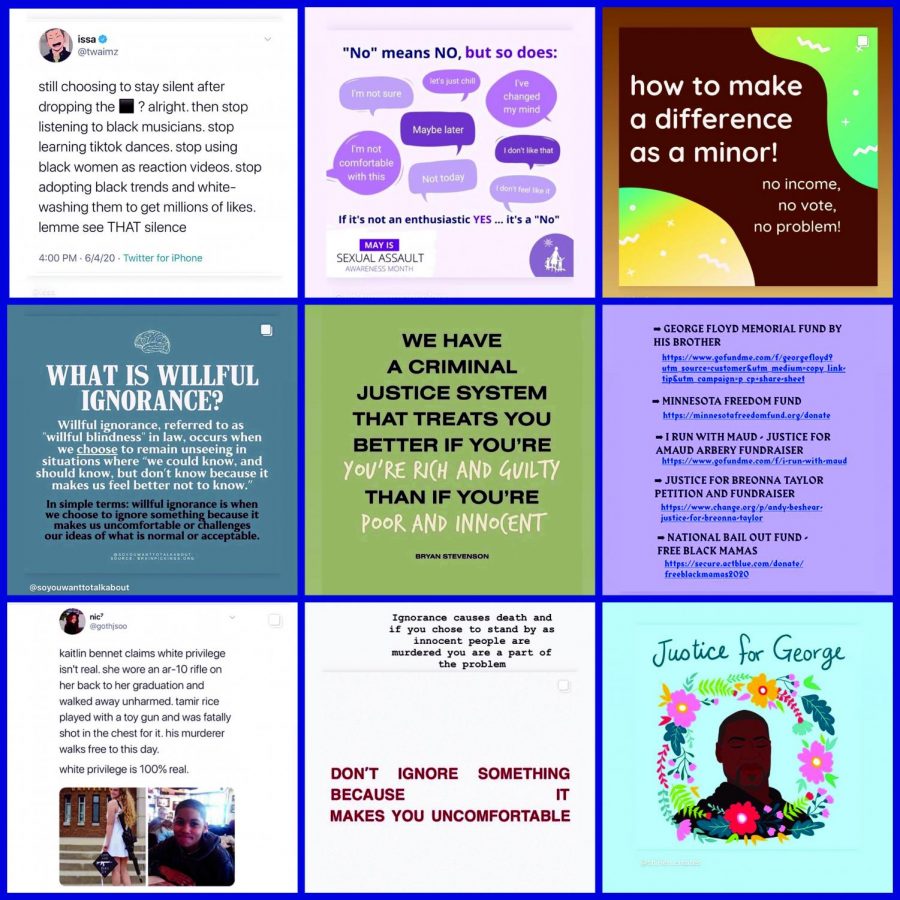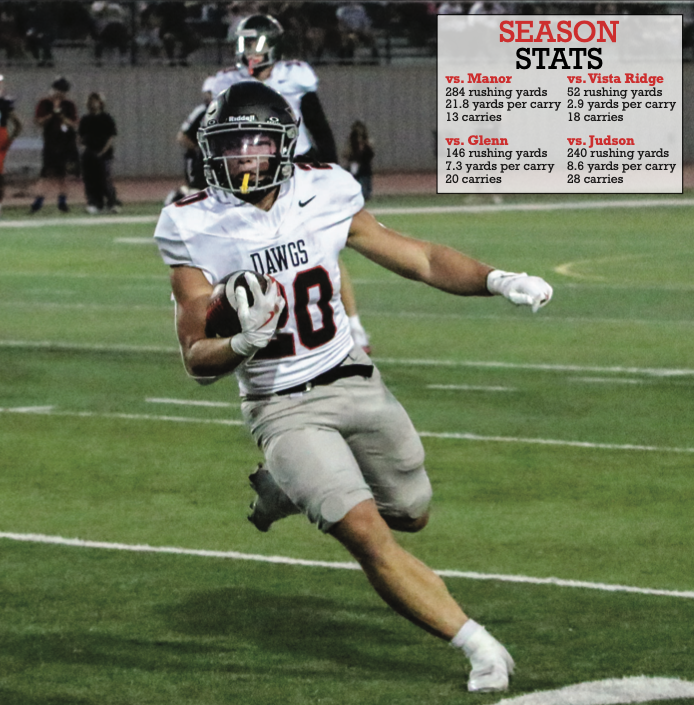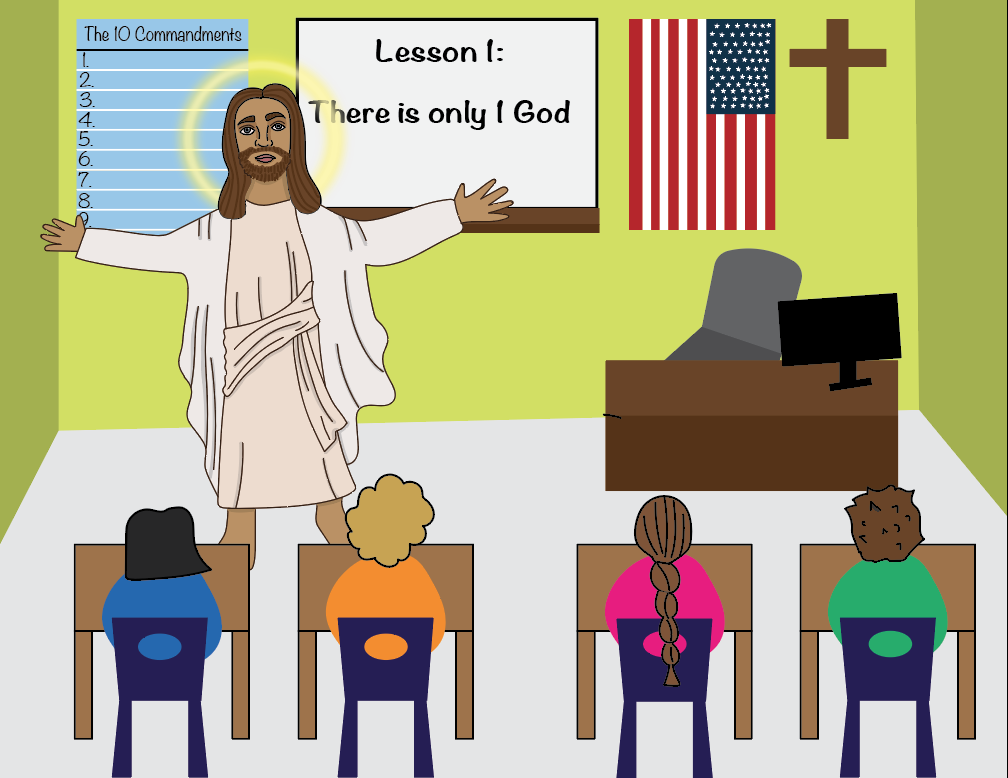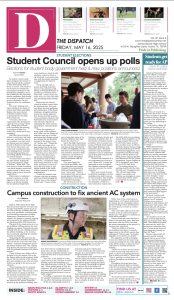Students speak out on social media
Teenagers use all kinds of platforms to promote political activism
COURTESY OF Kaia Pierce’s Instagram
SHARE AND REPOST: Senior Kaia Pierce posts and reposts others’ art onto her Instagram story as a way of political activism. Kaia mainly posts about gender inequality and the Black Lives Matter Movement. PHOTOS
November 12, 2020
It’s bedtime, and for high school students it is one last chance to catch up on social media. A quick stop on TikTok yields a video on the upcoming election, while a switch to Instagram leads to a story about the Black Lives Matters movement. Students have become more aware of the world around them.
Whether it is through Twitter, Instagram, Snapchat, or TikTok, some teenagers have been using every possible platform for political activism.
“I post information that explains the term ‘white privilege’,” senior Katie Golson said. “I think that social media is such an ingrained part of our lives now so it makes sense to me that activism should be a part of it. People are constantly receiving information through social media whether or not they know it and I hope to spread things that are factually true.”
Along with Instagram, TikTok is a very popular platform for teenagers as well as political activism due to its short videos that are often extremely effective.
“It is important to talk about these things because if one person can see what you post, they can be inspired by it,” senior Kaia Pierce said. “I also think that since I have a little bit of a following on TikTok, it is important for me to talk about these things and to show everyone that they are not alone.”
One form of political activism that is also popular is where students repost resources or educational information regarding their topic of choice on their Instagram stories.
“For me, Instagram is a lot more personal because I know at least 75% of my followers,” Pierce said. “It does not matter the number of followers you have, if you have one or 100 it does not matter.”
Since the 2020 election is in less than a month, students have been using this topic to repost and share their beliefs to their own following.
“I mostly post bi-partisan voting information because I don’t want to be written off as just ‘far left’ which leads people to ignore what I say,” Golson said. “Even though the majority of my followers are high schoolers, a lot of seniors are turning 18 which makes them eligible to vote. I also have people over the age of 18 that follow me who can also vote and I think spreading information is really necessary because voting is so important.”
Hotlines, petitions, and voting information are just a few of the things students use to post.
“I love when people ask me questions about the information I post,” Golson said. “I think it is so amazing to actually see a change resonate within someone. My biggest goal is to point out the misinformation that is currently being spread and hopefully help others make educated decisions.”
Political activism through social media is not just for students, teachers also make sure to get involved in different ways.
“I have made an effort to follow more social activists on Instagram and Twitter so that I’m being exposed to more viewpoints each time I am scrolling,” science teacher Masie Martin said. “However, I very rarely post on any of my social media accounts anymore and have held off on making social activism posts since it’s felt ungenuine and performative.”
Even though students at Bowie are not afraid to share their beliefs, there can be some disadvantages for being so open.
“People argue with you constantly or try to rile you up by swiping up and saying negative things,” Golson said. “I also lose Instagram followers which is eye opening because you start to see where people fall on issues by their response. Even though this can be annoying, I remember why I do this which in the end makes it all worth it.”
According to Pew Research, more than half of teenage social media users look at political activism sites and accounts.
“Social media has some downsides, but I think the ability to raise awareness of important issues is one of the best things about it,” Martin said. “I am really supportive of students using social media for activism, and I think it’s incredibly brave. It’s inspiring to see students come together and actively demand a better and more just world for themselves and their peers.”
Students are making sure to alert their peers on social media to vote in the election on Tuesday, Nov. 3 if they are able to.
“I think especially right now with these upcoming, unknown months it gives me hope to see others post about their beliefs and how we can make a more accepting society,” Pierce said. “To see people my age who I have never seen talk about such significant topics makes me beyond happy.”









